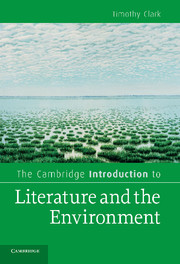Book contents
- Frontmatter
- Contents
- List of illustrations
- Preface
- Acknowledgements
- Introduction
- Romantic and anti-romantic
- Chapter 1 Old world romanticism
- Chapter 2 New world romanticism
- Chapter 3 Genre and the question of non-fiction
- Chapter 4 Language beyond the human?
- Chapter 5 The inherent violence of western thought?
- Chapter 6 Post-humanism and the ‘end of nature’?
- The boundaries of the political
- Science and the struggle for intellectual authority
- The animal mirror
- Notes
- Further reading
- Index
- Cambridge Introductions to …
Chapter 4 - Language beyond the human?
Published online by Cambridge University Press: 05 June 2012
- Frontmatter
- Contents
- List of illustrations
- Preface
- Acknowledgements
- Introduction
- Romantic and anti-romantic
- Chapter 1 Old world romanticism
- Chapter 2 New world romanticism
- Chapter 3 Genre and the question of non-fiction
- Chapter 4 Language beyond the human?
- Chapter 5 The inherent violence of western thought?
- Chapter 6 Post-humanism and the ‘end of nature’?
- The boundaries of the political
- Science and the struggle for intellectual authority
- The animal mirror
- Notes
- Further reading
- Index
- Cambridge Introductions to …
Summary
A pervasive argument in ecocriticism is that language is a decisive human environment and that its currently dominant forms can rightly be called an environmental problem. This refers to such things as the instrumentalist and anthropocentric language of politics and administration or of official documents for regional planning (e.g., assessing the destruction of an ancient wood in terms of ‘lost recreational facilities’). More strikingly, it also includes human-centred assumptions about what language is – a mere tool for humans to represent and manipulate the world?
A persistent target of environmental critics, especially in the 1990s, was a view of language which they attributed loosely to ‘postmodern’, ‘deconstructive’ or ‘post-structuralist’ theory. This is the claim that language forms a kind of cultural prison, confining its users to the specific conceptions and presumptions it projects – an argument encountered often in third- or fourth-hand accounts of thinkers such as Jacques Derrida or Jean-François Lyotard, even though their actual arguments are very different. Ecocritics saw themselves as resisting claims that ‘no authoritative and definitive expression or conception of reality is possible’ and that ‘all we can ever perceive about the world are shadows, and that we can never escape our particular biases’. At times this led to what are now acknowledged as ecocritical caricatures of so-called ‘post-structuralism’. The relatively uncontroversial argument that human beings cannot know reality absolutely, without some cultural presuppositions, was sometimes taken to be the patently silly one of denying the existence of reality altogether.
- Type
- Chapter
- Information
- Publisher: Cambridge University PressPrint publication year: 2011

